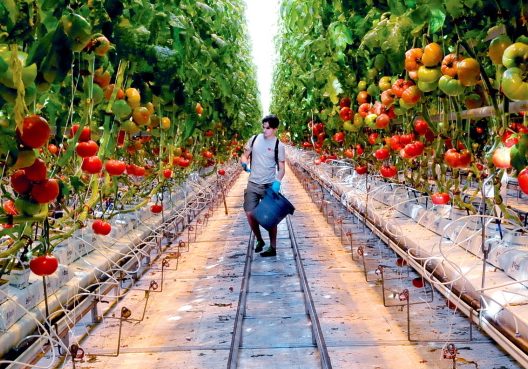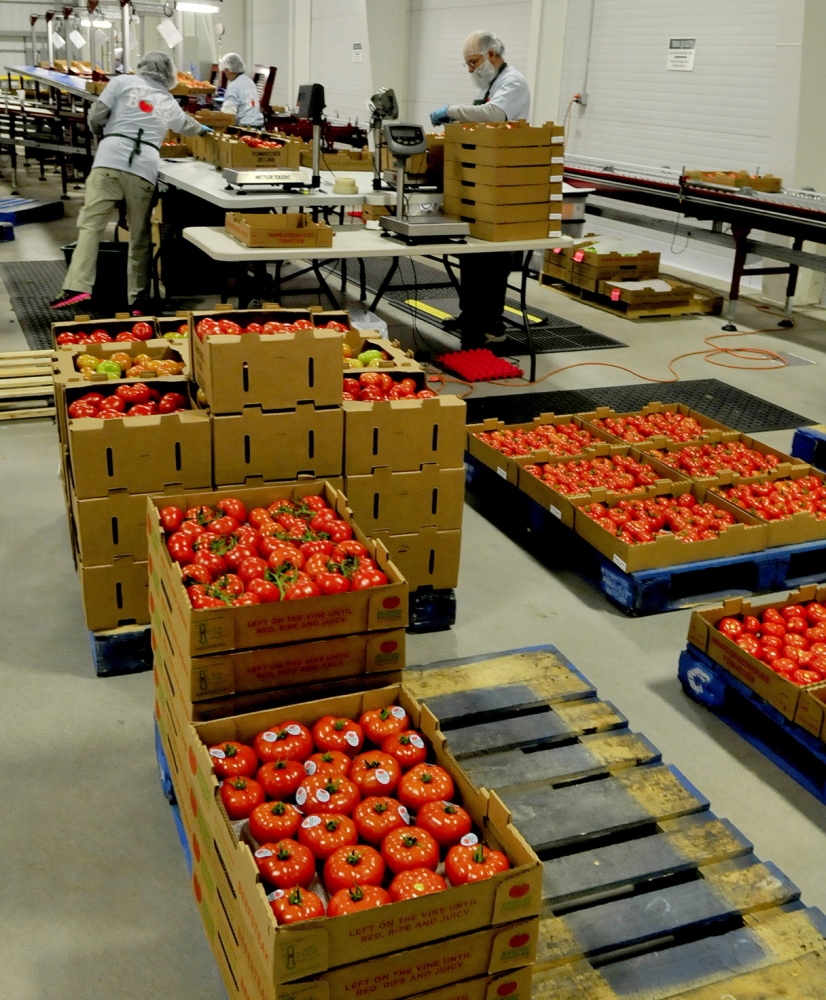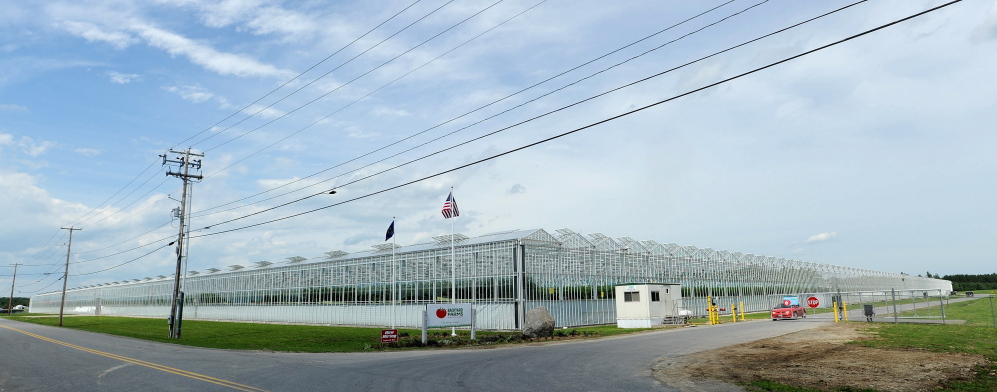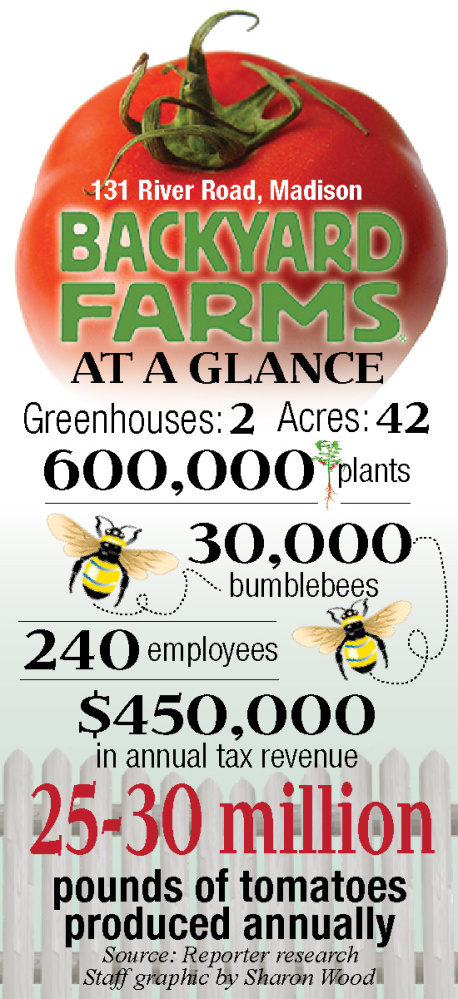Landmark tomato-grower Backyard Farms in Madison has been sold to a Canadian produce company in a deal that officials said would keep greenhouse operations running without interruption or layoffs.
Mastronardi Produce Ltd., of Kingsville, Ontario, announced the purchase Friday in a joint news release with Backyard Farms, which was founded a decade ago and operates two greenhouses on 42 acres at 131 River Road in Madison.
Mastronardi Produce, which packs its specialty and commodity non-GMO greenhouse produce under the SUNSET brand, said its acquisition of Backyard Farms will increase its internal greenhouse network to six locations across North America and will boost the combined company’s headcount to about 3,000 employees.
The company is not releasing the purchase price of Backyard Farms, according to Paul Mastronardi, president and CEO of Mastronardi Produce.
According to Mastronardi, the company has been following the trajectory of Backyard Farms for the past few years and decided to buy the Madison business because it is “well-regarded brand in the industry with great people and superior quality.”
Jim McConnon, an extension specialist and professor of economics at the University of Maine at Orono, said these kinds of deals are standards across all industries, and that the buy could be a catalyst for further growth at Madison’s largest employer.
“In this particular market area, you have a company, Mastronardi … serving the Canadian market, and I’m sure looking at an opportunity to penetrate and do business and expand their business into the U.S. market,” McConnon said in an interview Friday. “They saw Backyard Farms as an outfit that, once acquired, would be able to help them even further growing their reach.”
Backyard Farms is the largest commercial grower of year-round tomatoes in New England and produces 25 million to 30 million pounds of non-GMO tomatoes annually from about 600,000 plants, employing about 200 people.
Madison Town Manager Tim Curtis said in an interview Friday that the acquisition is a good thing, and that Stuart Jablon, the company’s president, spoke positively of the merger.
“The new owners are actually in this business of growing and marketing produce, while the older owners, (a branch of Fidelity Investments), were just on the financial side of things,” he said.
The important thing for the town, Curtis said, is that there will be no layoffs or major changes to personnel, though he didn’t know whether Mastronardi plans to expand Backyard Farms.
“It’s a good thing to stabilize the employment and then talk about how we can grow,” Curtis said.
Madison gets about $450,000 in tax revenue from Backyard Farms, which has a credit enhancement agreement with the town as a tax incentive.
While there won’t be any “immediate” changes in personnel, according to Mastronardi, one thing that attracted the large company to Backyard Farms is its labor force.
“As a large and rapidly growing organization, Mastronardi has a lot of need for talent across its business, which is likely to create additional career and growth opportunities over time,” he said. “For those roles that may see some change, Mastronardi expects there may be opportunities within the broader organization.”
The growing practices under Mastronardi Produce will also stay the same, according to Mastronardi, while giving more customers access to Backyard Farms’ tomatoes.
The merger puts the company in a better position to serve the Northeast, according to the news release, where consumers demand locally grown, fresh produce.
In the news release, Mastronardi said that the leading grower and distributor of greenhouse produce in North America has “long been impressed” with Backyard Farms’ commitment.
“Backyard Farms not only is a growing, customer-focused tomato grower with a strong and well-known presence in the Northeastern United States, but it also shares the same community-centric ethos that drives Mastronardi,” he said.
The company believes that consumers are looking for more local produce, according to Mastronardi, and trends show they are also looking for greater variety in tomatoes. Combined with Backyard Farms, Mastronardi Produce hopes to fill this need in the Northeastern United States.
For Backyard Farms, the merger with a larger brand could help it market its products better in the United States, according to McConnon, the UMaine economics professor.
“Backyard Farms has a unique brand and a pretty solid brand in that particular market niche and product category,” he said. “I would expect that to be maintained and further marketed.”
Given Mastronardi’s reach across North America, McConnon said he would expect that Backyard Farms will grow its production.
“I think we have to wait and see. Time will tell what the local impact is going to be, but I expect that it will support further growth and sustainability of Backyard Farms here in Maine,” he said.
Along the way, Backyard Farms also has faced hardships, such as a whitefly infestation in 2014 that forced it to cease operations at its greenhouse and furlough employees.
It grows several varieties of tomatoes, including beefsteak, cocktail and tomatoes on the vine, which are sent to stores including Hannaford, Whole Foods, Walmart and Shaw’s.
The farms’ greenhouses are hydroponic, meaning the plants are not grown in soil, but are instead grown in a water solution that is stocked with nutrients. The greenhouses are kept between 69 to 72 degrees during the day and about 10 degrees cooler at night.
Mastronardi Produce was founded in the 1940s and sources, grows, packages and distributes more than 50 varieties of non-GMO tomatoes, cucumbers, peppers and other products throughout the year across North America. The company also distributes the specialty brands Campari, Zima, Angel Sweet and Kumato tomatoes.
Madeline St. Amour — 861-9239
mstamour@centralmaine.com
Twitter: @madelinestamour
Send questions/comments to the editors.







Comments are no longer available on this story